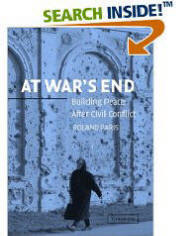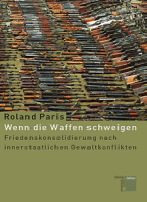At War's End: Building Peace After Civil Conflict
by Roland Paris
Cambridge University Press, 2004
Exploring the challenge of rehabilitating countries after civil wars, this study finds that attempting to transform war-shattered states into liberal democracies with market economies can backfire badly. Roland Paris examines the assumptions and outcomes of fourteen missions launched in the 1990s, from Namibia to East Timor, and finds that the rapid introduction of democracy and capitalism in the absence of effective institutions can increase rather than decrease the danger of renewed fighting. He sets out an alternative strategy for post-conflict peacebuilding, one that emphasizes the reconstruction of effective security, police and judicial institutions as the essential first step in the gradual transformation of war-torn states into stable market democracies. This volume speaks simultaneously to policymakers and scholars who are interested in the challenges of post-conflict rehabilitation and in the relationship between liberal democracy, market-oriented economics, and peace.
** Winner of the
Grawemeyer Award for
Ideas Improving World Order
** Winner of the International Studies Association's
Chadwick Alger
Prize for best book on international
organization
** Winner of the Eugene M. Kayden Award for best book
manuscript by a faculty member at the University of Colorado
REVIEWS
"At War's End is the state of the art treatment of the dilemmas of reconstruction and peacebuilding after war, intervention and civil conflict."
- Michael Ignatieff, Director, Carr Center for Human Rights Policy, Harvard University
"At a moment when politicians and pundits are debating the wisdom of nation-building, Roland Paris brings us an important and groundbreaking book. Theoretically rich, historically informed, and analytically innovative, this authoritative volume will be invaluable to scholars and practitioners alike who are interested in understanding what it takes to build peace after civil wars."
- Thomas G. Weiss, Presidential Professor and Director, Ralph Bunche Institute for International Studies, CUNY Graduate Center
"This is the best book yet written on peacebuilding operations, a must for both academics and practitioners."
- Peter Viggo Jakobsen, Associate Professor in International Relations, University of Copenhagen
"It is hard to imagine a more timely study than Roland Paris's superb analysis of the peacebuilding experience of the last decade. As the United States gropes its way through the morass of Iraq, its leaders need to read At War's End and concentrate on developing timetables and building institutions."
- Robert A. Pastor, Vice President of International Affairs, American University
"This book will surely stand as the definitive treatment of the intellectual and ideological origins of international peacekeeping and peacebuilding in the post-Cold War era. The breadth of cases, the rigorous assessment of outcomes, and depth of policy insight are most impressive."
- Fen Osler Hampson, Professor of International Affairs and Director, Norman Paterson School of International Affairs, Carleton University
"Few studies of peacekeeping and peacebuilding merit the description ‘breakthrough.' This is one of them."
- Michael Pugh, Director, University of Plymouth International Studies Centre and Editor, International Peacekeeping journal
"At War's End is a major contribution to an understanding of the theory, practice, and consequences of peacekeeping that should be read by scholars and practitioners alike. Roland Paris expertly demonstrates how peacekeeping has evolved from the modest attempt to keep the peace into the much more ambitious agenda of engineering the socio-political conditions for a stable peace. But, as Paris documents, the road to hell can be paved with good intentions; the attempt by the international community to promote democracy and markets has created, in various places, not a liberal peace but instead renewed competition and violence. His recommendations should be debated seriously by all those who are concerned about the future of peacekeeping."
- Michael Barnett, Professor of Political Science and Director, International Relations Program, University of Wisconsin
"Roland Paris's important new book... deserves to become the essential text on peacebuilding operations for practitioners and analysts alike."
- Paul Williams, Lecturer in Security Studies, University of Birmingham. Click here to read the full review in International Affairs.
"In his methodical and detailed presentation of the role that elections have played in 14 transitions from conflict to peace in the 1990s, Paris convincingly argues that holding elections prematurely can do more harm than good."
- Salman Ahmed, Senior Political Advisor, United Nations. Click here to read the full review in Foreign Affairs.
"Paris's excellent work will quickly become the most authoritative source on this topic."
- Roberto Belloni, Lecturer in International Politics, Queen's University, Belfast. Reviewed in Political Science Quarterly.
"...an excellent reference source for scholars of conflict studies as well as a repository of knowledge for anyone interested in the process and the context of civil wars."
- Emilian Kavalski, Loughborough University, UK. Reviewed in African Studies Quarterly.
"...an excellent book, which is very well written."
- Michael Dodson, Texas Christian University. Reviewed in Peace and Change.
"...definitely a must-read work."
- Helena Cobban, columnist, author and contributing editor, Boston Review.
"Paris offers a thoughtful study to anyone interested in the topic of peacebuilding after civil war. Practitioners, academics and students can all benefit from this book."
- Paul J. Magnarella, Warren Wilson College, Asheville, NC. Reviewed in Journal of Third World Studies.
"...it is worth urging U.S. foreign policy makers and others engaged or interested in international peacebuilding to read Roland Paris’ well written and well documented study, in the hopes that its insights and lessons will be learned by someone, sometime, that will pay dividends as the world moves further into the 21st Century."
- James G. Apple, Co-Editor, International Judicial Monitor and President, International Judicial Academy.
"At War’s End offers a compelling, succinct analysis of the dilemmas of peacebuilding. It is an important and highly welcome contribution to a debate that is only now developing. It sets the bar high for future analyses of the normative and theoretical underpinnings of peacebuilding practices."
- Dominik Zaum, Research Fellow in International Relations, University of Oxford. Reviewed in Millennium.
CONTENTS
Introduction
PART I FOUNDATIONS
Chapter 1 The Origins of Peacebuilding
Chapter 2 The Liberal Peace Thesis
PART II THE PEACEBUILDING RECORD
Chapter 3 Introduction to the Case Studies
Chapter 4 Angola and Rwanda: The Perils of Political Liberalization
Chapter 5 Cambodia and Liberia: Democracy Diverted
Chapter 6 Bosnia and Croatia: Reinforcing Ethnic Divisions
Chapter 7 El Salvador, Nicaragua, and Guatemala: Reproducing the
Sources of Conflict
Chapter 8 Namibia and Mozambique: Success Stories in Southern
Africa?
PART III PROBLEMS AND SOLUTIONS
Chapter 9 The Limits of Wilsonianism: Understanding the Dangers
Chapter 10 Towards More Effective Peacebuilding:
Institutionalization Before Liberalization
Chapter 11 Lessons Learned and Not Learned: Kosovo, East Timor,
Sierra Leone, and Beyond
Conclusion
ABOUT THE AUTHOR
To read an interview with Roland Paris in Development in Practice, click here.
ORDERING INFORMATION
For information on ordering the book, click here.
GERMAN EDITION
Published as Wenn die Waffen schweigen: Friedenskonsolidierung nach innerstaatlichen Gewaltkonf likten (Hamburg: Hamburg Editions, 2007). Click here to order from Amazon.de.

